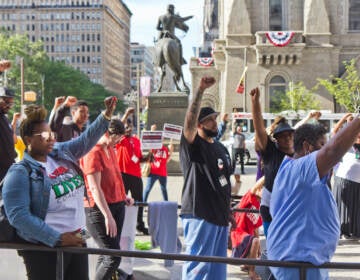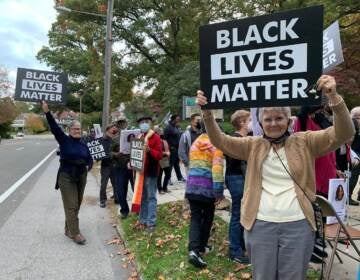Philly NAACP president talks about George Floyd protests
Rodney Muhammad, president of the Philadelphia chapter of the NAACP, talks about this past weekend of protests in response to the killing of George Floyd.
Listen 8:12
Philadelphia NAACP President Rodney Muhammad speaks at a peaceful protest at City Hall. (Kimberly Paynter/WHYY)
Unrest and looting shook Philadelphia over the weekend, but the city also witnessed peaceful rallies and protests to decry the death of George Floyd, the Black man who died one week ago at the hands of a white Minneapolis police officer. The officer has been charged with third degree murder and manslaughter.
One speaker over the weekend at City Hall in Philadelphia was Minister Rodney Muhammad, president of the Philadelphia chapter of the NAACP, the country’s oldest and largest nonpartisan civil rights organization.
He joined Morning Edition host Jennifer Lynn to talk about the turbulent weekend in Philadelphia.
–
Minister Muhammad, welcome.
Well, thank you for having me. Good morning.
Pleasure to have you, sir. There are many layers to our story of police brutality and the fight for justice for all people. What is unique about the anger and sadness being expressed in Philadelphia now?
Well, to be honest, for Black America, when we saw the horrific ordeal of that video of George Floyd’s life being strangled right out of him, it was another addition to a long set of chapters of police brutality that we suffered in this country. We have never resolved this problem. The police, they represent the enforcers of a racist system. That’s the universe that Black people live in. So it’s the straw that broke the camel’s back. Some say it’s the drop of water that caused the cup to overflow. We reached the boiling point, a tipping point. We can see that America, Black and white, is upset about this. I think that people are open to conversation. It doesn’t look like this is going to go away as fast as some may have hoped.
Yeah, and you addressed a peaceful crowd yesterday in front of City Hall. What message did you most fervently want to share with the people who gathered with you?
There’s been a problem in our struggle even since the ‘60s and well-meaning whites who have worked hard with Dr. King and others to try to end some of the …{inaudible} they saw Black people living in and not being able to vote. There are some things that happen to Black people that are very clear to white America that injustices are being done to us. But there are other systemic things that are very, very difficult for white America to see, as they have expressed. And because of the difficulty in seeing the disparities and the unequal way we’re dealt with, it becomes difficult to really do something effective about police brutality.
So our message yesterday was at this time, we should be having a conversation about the difficult decision of reassigning white police officers to white areas of the cities of America, and reassigning officers of color to those communities that are identifiably Black or African American and brown people until something is done on a large scale therapeutic level. We’ll keep counting bodies in the morgue because [of] the sickness that is expressed by too many white officers. We don’t have time to treat it [with] on-the-job training while they are overseeing Black people in neighborhoods primarily populated by us with a whole host of disadvantaging circumstances.
Now, many officers, of course, are doing their jobs and being respectful of you.
We believe that there are good officers of every stripe and color or ethnicity, if you will. They’re just not good enough to stop the bad.
Yes, sir. Sir, is there a promise? I’m sorry to interrupt. There is a promise to this nation for justice for all. What meaningful reform can you work toward to help keep bad cops accountable? I know you do such work.
Well, we have to think of the long-term game, obviously, legislation and policy. Those are things that the NAACP focuses on. And that’s why they work in the courts to roll back what we call civil rights gains, because they know that in a very solid way, when we can get laws changed, when we can get a policy established, we have that basis for which to work from [within] the law. Even Dr. King said, the law can’t make a man love me. He said religion and education must do that. He said, but the law can keep him from lynching me, and I think that’s pretty important, too. So the NAACP is focused on a long game, and our long game is we got to do something in November to change the personnel in government.
And tomorrow is primary Election Day for those who were planning to go to the polls in some of the neighborhoods in Philadelphia that have been under duress. That is a difficult journey to get to those polls.
Well, it is. And you know, the NAACP, along with others, we’re saying, “Look, you came out in numbers because you want to be heard. Come out in even greater numbers that you can be counted. Come out and vote.”
Sir, you are a minister; you counsel people; you comfort them. For those who are sad, who are scared, men and women, young and old, Black and white. Where is their hope?
Well, our hope is in righteousness. And the only psychology that’s gonna work for white America and Black America today is truth. If we’re not going to be truthful, we’re not going to repair the psychological state that white supremacy has done to make someone who’s white feel supreme only because the color of their skin is white. To make someone else feel less than only because the color of their skin is black. And we’ve both been here over 400 years. And we’ve trained ourselves in these kinds of dark dichotomies and these dynamics. So there has to be a real re-education process. Short of overhauling the police departments in America that have grown very powerful through their unions… Now, it’s not likely that that’s going to happen for a long time. And that’s why I’m calling for a reassignment of officers who are white from areas that are predominantly identifiably Black. And, you know, there is hope. If we start taking some of the right steps, there is hope. If white America and Black America have the real kind of conversation, there is hope. If we change the relationship from a colonizer/colonized relationship, or a slave master/slave relationship, to one where we’re on equitable terms and we live like human beings here.
Thank you. Thank you so much.
It can get better.
I agree. Thank you so much. Minister Rodney Muhammad, president of the Philadelphia chapter of the NAACP. Thank you for your time this morning.
WHYY is your source for fact-based, in-depth journalism and information. As a nonprofit organization, we rely on financial support from readers like you. Please give today.





